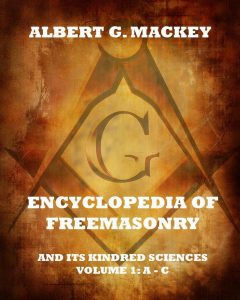Encyclopedia Of Freemasonry And Its Kindred Sciences Volume 1: A-C – Albert G. Mackey
Dr. Albert G. Mackey appears as author of this ” Encyclopedia of Freemasonry and its Kindred Sciences,” which, being a library in inself, superseded most of the Masonic works which have been tolerated by the craft — chiefly because none better could be obtained. Here is a work which fulfils the hope which sustained the author through ten years’ literary labor, that, under one cover he “would furnish every Mason who might consult its pages the means of acquiring a knowledge of all matters connected with the science, the philosophy, and the history of his order.”
Up to the present time the modern literature of Freemasonry has been diffuse, lumbering, unreliable, and, out of all reasonable proportions. There is, in Mackey’s “Encyclopaedia of Masonry,” well digested, well arranged, and confined within reasonable limits, all that a Mason can desire to find in a book exclusively devoted to the history, the arts, science, and literature of Masonry.
This is volume one out of four and covering the letters A to C.
Format: Paperback.
Encyclopedia Of Freemasonry And Its Kindred Sciences Volume 1: A-C.
ISBN: 9783849688271
Available at amazon.com and other venues.
Biography of Albert G. Mackey (from wikipedia.com)
Albert Gallatin Mackey was born in Charleston, South Carolina, the son of John Mackey (1765 – December 14, 1831), a physician, journalist and educator, and his wife. His father published The American Teacher’s Assistant and Self-Instructor’s Guide, containing all the Rules of Arithmetic properly Explained, etc. (Charleston, 1826), the most comprehensive work on arithmetic that had been published in the United States. His brother was Edmund William McGregor Mackey, later a member of the U.S. House of Representatives from South Carolina.
After completing his early education, Albert Mackey taught school for some time to earn money for medical school. He graduated from the medical department of the College of South Carolina in 1832. He settled in Charleston, South Carolina. In 1838 he was appointed demonstrator of anatomy in that institution.
In 1844 he abandoned the practice of medicine. For the rest of his life, he wrote on a variety of subjects, but specialized in the study of several languages, the Middle Ages, and Freemasonry. After being connected with several Charleston journals, he established in 1849 The Southern and Western Masonic Miscellany, a weekly magazine. He maintained it for three years, mostly by his own expense. He conducted a Quarterly 1858-1860 which he devoted to the same interests.
He acquired the Greek, Latin, Hebrew, and continental languages almost unaided, and lectured frequently on the intellectual and moral development of the Middle Ages. Subsequently, he turned his attention exclusively to the investigation of abstruse symbolism, and to cabalistic and Talmudic researches.
He served as Grand Lecturer and Grand Secretary of The Grand Lodge of South Carolina, as well as Secretary General of the Supreme Council of the Ancient and Accepted Scottish Rite for the Southern Jurisdiction of the United States.
Mackey was a Union sympathizer during the Civil War and in July, 1865, President Andrew Johnson appointed him Collector of the Port of Charleston. He ran for the United States Senate in South Carolina in 1868, but was narrowly defeated by Republican Frederick A. Sawyer.
Mackey moved to Washington, D.C. in l870. He died in Fortress Monroe, Virginia in 1881.
(The text of the last section was taken from a Wikipedia entry and is available under the the Creative Commons Attribution-ShareAlike License.)
Publisher’s Note: This book is printed and distributed by Createspace a DBA of On-Demand Publishing LLC and is typically not available anywhere else than in stores owned and operated by Amazon or Createspace.

